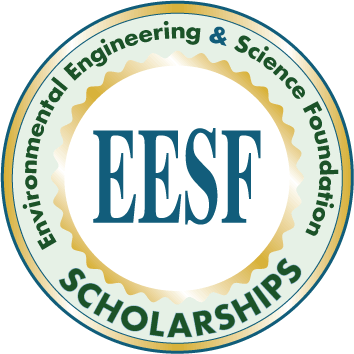Announcing the 2023 Environmental Engineering and Science Foundation Scholarships Recipients
The Environmental Engineering and Science Foundation (EESF) has as its Mission “to secure and direct resources to advance environmental engineering and science in the areas of research, education and practice”.
In line with its mission, EESF has created annual scholarships for Environmental Engineering and Environmental Science students at the Master’s level.
In 2023, eight $2,500 scholarships are being awarded to outstanding students seeking their Master’s Degree in Environmental Engineering and Master’s Degree in Environmental Science at accredited U.S. universities.
These individuals emerged from a highly competitive process that considered academic achievement, resume, essay, and letters of recommendation.
EESF was able to attract a sizable number of applicants and the quality of their qualifications was outstanding.
It is our privilege to introduce these outstanding recipients and provide excerpts from their resumes and essays.

MASTER'S DEGREE IN ENVIRONMENTAL ENGINEERING
Madeline Deck
Virginia Tech
My goals are to reduce the number of illnesses and deaths caused by waterborne illnesses in the United States by studying mitigation strategies for pathogen proliferation and promoting outreach of the most practical strategies. This will enable the public to protect their own health.

MASTER'S DEGREE IN ENVIRONMENTAL ENGINEERING
Hannah Leibman
University of Cincinnati
Whether out in the field or in a laboratory, my goal is to address the challenge of providing clean water by developing bio-remediation technology. My background in biology research, interest in nature, and passion for environmental sustainability have led me to work towards this goal.

MASTER'S DEGREE IN ENVIRONMENTAL ENGINEERING
Jesseri Enya Jensen (Bleazard)
University of Colorado Denver
Understanding how to build sustainable urban watersheds capable of overcoming flooding is my ultimate goal. My professional goals lead to my ultimate goal by shaping my knowledge and providing me with the resources to become the best engineer I can be.

MASTER'S DEGREE IN ENVIRONMENTAL ENGINEERING
Peyton Allisha Woodruff
North Carolina State University
Continuing my education would help me be a part of the solution to issues that I’ve witnessed in my personal and professional life, while aiding in the health and safety of our communities who feel that they are overlooked and forgotten.

MASTER'S DEGREE IN ENVIRONMENTAL ENGINEERING
Claire Elizabeth Funk
Clemson University
As a professional wastewater consultant, I plan to suggest new technologies that will make the process more energy efficient and lead to cleaner wastewater which will further protect public health. As I explore wastewater treatment in academia and consulting, the greatest goal I have for my career is to make an impact while protecting the environment and public health.

MASTER'S DEGREE IN ENVIRONMENTAL ENGINEERING
McKenzie Celine Pearson
University of Minnesota
I have had the opportunity to get involved with organizations and initiatives that support communities that are not afforded the privilege of environmentally safe living conditions. As I enter my professional career, I want to apply my technical and leadership skills to create solutions for communities disproportionately affected by environmental harm.

MASTER'S DEGREE IN ENVIRONMENTAL ENGINEERING
Natalia Taiz Salazar
University of California, Davis
I hope to receive my doctorate degree in environmental engineering, particularly in research related to climate change and its impact on low-income and minority communities as my goal is to give back to my community and influence engineers to fight for the communities they interact with.

MASTER'S DEGREE IN ENVIRONMENTAL SCIENCE
Maxwell Donald Pepperdine
University of California, Santa Barbara
Throughout my future professional goals, I look forward to working on a range of environmental issues that benefit both the natural environment and public health. Not only is this crucial for people to understand and recognize, but it also provides a strong argument for the protection of our natural systems.

